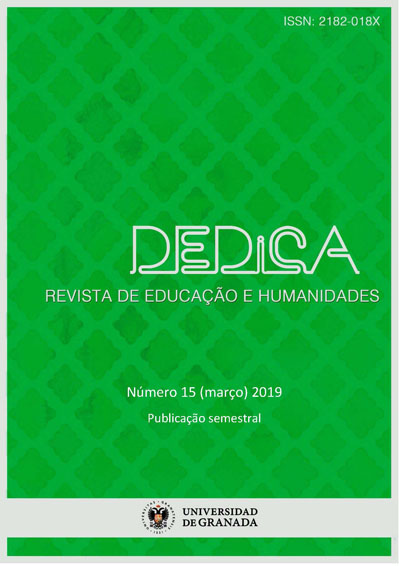Music Psychology and Me
DOI:
https://doi.org/10.30827/dreh.v0i15.8096Palabras clave:
Historias de vida, Psicología de la MúsicaResumen
From the Introduction:
I was very honoured to receive a Lifetime Achievement Award from the Society for Education, Music and Psychology Research (SEMPRE) in 2017, and this has given me a chance to reflect on the 40 years or so during which I have been working in these fields. Many changes have taken place over that time - nearly all for the better. I hope it will be of interest to readers to hear my personal story, in which I will chart - in a completely rambling and intuitive but loosely chronological fashion - some of the twists and turns in my career. Some of these have been influenced by changes in music psychology itself; some by career moves; and some because I ran into significant others at different points on the journey.
Descargas
Citas
Bryant, P.E. (1974/2017). Perception and understanding in young children: An experimental approach. London: Methuen/Routledge.
Doise, W. (1986) Levels of explanation in social psychology. Cambridge: Cambridge University Press.
Donaldson, M. (1978). Children's minds. Glasgow: Fontana/Collins.
Fumoto, H., Robson, S., Greenfield, S. & Hargreaves, D.J. (2012). Young children’s creative thinking. London: Sage.
Gardner, H. (1973). The arts and human development: A psychological study of the artistic process. New York: Wiley.
Gordon, E. (1965). Musical aptitude profile. Boston: Houghton Mifflin.
Gordon, E. (2007). Learning sequences in music: A contemporary music learning theory. GIA Publications.
Hargreaves, D.J. (1974). Situational influences on divergent thinking. British Journal of Educational Psychology, 44, 84-88.
Hargreaves, D.J. (1982). The development of aesthetic reactions to music. Psychology of Music, Special Issue, 51-54.
Hargreaves, D.J. (1986a). The developmental psychology of music. Cambridge: Cambridge University Press.
Hargreaves, D. J. (1986b). Developmental psychology and music education. Psychology of Music, 14(2), 83-96.
Hargreaves, D.J. & Bolton, N. (1972). Selecting creativity tests for use in research. British Journal of Psychology, 63, 451-462.
Hargreaves, D.J. & Bonneville-Roussy, A. (2018). What is ‘open-earedness’, and how can it be measured? Musicae Scientiae, 22(2), 161-174.
Hargreaves, D.J. & Galton, M. (1992). Aesthetic learning: psychological theory and educational practice, in 1992 N.S.S.E. yearbook on the arts in education, eds. B. Reimer & R.A. Smith. Chicago: N.S.S.E, pp.124-150.
Hargreaves, D.J. & Lamont, A.M. (2017). The psychology of musical development. Cambridge: Cambridge University Press. Pp. xix + 344.
Hargreaves, D.J. & North, A.C. (eds.) (1997). The social psychology of music. Oxford: Oxford University Press. pp. xv + 319.
Hargreaves, D.J., Galton, M. & Robinson, S. (1996). Teachers’ assessments of primary children’ s classroom work in the creative arts. Educational Research, 38, 199-211.
Hargreaves, D.J., Marshall, N. & North, A.C. (2003). Music education in the 21st century: a psychological perspective. British Journal of Music Education, 20(2), 147-163.
Hargreaves, D.J., Miell, D.E., MacDonald, R.A.R. (eds.) (2012). Musical imaginations. Oxford: Oxford University Press.
Hargreaves, D.J., Purves, R.M., Welch, G.F. & Marshall, N.A. (2007). Developing identities and attitudes in musicians and music teachers. British Journal of Educational Psychology, 77(3), 665-682.
Hargreaves, D.J., Robson, S., Greenfield, S. & Fumoto, H. (2014). Ownership and autonomy in early learning: The Froebel Research Fellowship project, 2002-15. Journal of Early Childhood Research, 12(3), 308-321.
Lamont, A.M., Hargreaves, D.J., Marshall, N. & Tarrant, M. (2003). Young people’s music in and out of school. British Journal of Music Education, 20(3), 1-13.
Louven, C. (2016). Hargreaves’ “open-earedness”: A critical discussion and new approach on the concept of musical tolerance and curiosity. Musicae Scientiae, 20(2), 235-247.
MacDonald, R.A.R., Hargreaves, D.J. & Miell, D.E. (eds.) (2002). Musical identities. Oxford: Oxford University Press. pp. x + 213.
MacDonald, R.A.R., Hargreaves, D.J. & Miell, D.E. (eds.) (2017). Handbook of musical identities. Oxford: Oxford University Press. Pp. xix + 876.
Miell, D.E., MacDonald, R.A.R. & Hargreaves, D.J. (eds.) (2005). Musical communication. Oxford: Oxford University Press. pp. xvi + 433.
Miller, G. A., & Selfridge, J. A. (1950). Verbal context and the recall of meaningful material. The American Journal of Psychology, 63(2), 176-185.
North, A.C. & Hargreaves, D.J. (2008). The social and applied psychology of music. Oxford: Oxford University Press. pp. xi + 476.
Ockelford, A. (2006). Implication and expectation in music: A zygonic model. Psychology of Music, 34(1), 81-142.
Schubert, E., Hargreaves, D.J. & North, A.C. (2014). A dynamically minimalist cognitive explanation of musical preference: Is familiarity everything? Frontiers in Psychology: Auditory Cognitive Neuroscience, 5, 1-8.
Shuter-Dyson, R. & Gabriel, C. (1981). The psychology of musical ability (2nd ed.). London: Methuen.
Sloboda, J. (2005). Exploring the musical mind: Cognition, emotion, ability, function. Oxford: Oxford University Press.
Swanwick, K., & Tillman, J. (1986). The sequence of musical development: a study of children's composition. British journal of Music Education, 3(3), 305-339.
Webster, P. R. (1994). Measure of Creative Thinking in Music:(MCTM): Administrative Guidelines. Peter Webster.












